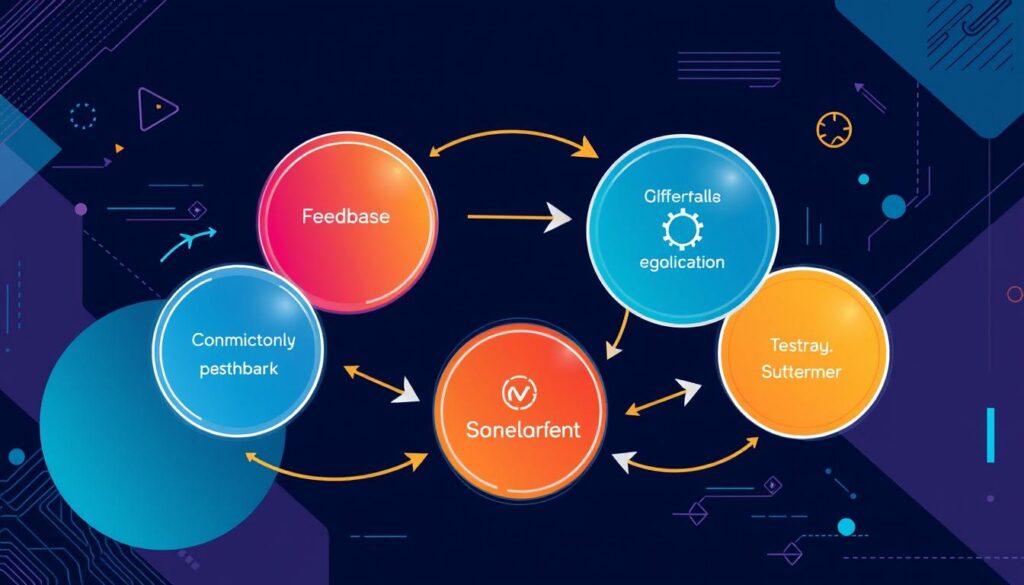In a fast-moving world, tailored software applications help businesses stand out. They enable companies to push beyond usual limits, gaining a competitive edge. With personalized software services, firms can improve their specific operations and outmaneuver rivals.
Unique software solutions are crucial for entities wishing to boost their productivity and efficiency. These specially made tools come with functions that perfectly suit an organization’s needs. So, they assist in making big strides in work output.
Top firms like EY, McKinsey, and Gartner highlight the importance of technological growth. They show that investing in smart, scalable software is a key focus for successful companies. The trend is clearly toward software that meets specific business goals.
Key Takeaways
- Custom bespoke software is becoming a fundamental differentiator for competitive businesses.
- Adoption of tailored solutions corresponds with significant improvements in performance metrics.
- Bespoke software drives higher efficiency across various industry sectors, fostering innovation.
- Investment in personalized software services reflects an anticipatory approach towards future growth.
- Integrating unique software solutions seamlessly with current business operations reduces disruptions.
- The sophistication and customization offered by bespoke software cannot be matched by generic solutions.
Understanding Bespoke Software Solutions
Today, everyone wants software that meets their exact needs. Bespoke software development answers this call by offering tailor-made solutions. These are not like common off-the-shelf options. Bespoke solutions are crafted just for your business’s workflow.
Definition and Characteristics
Custom software development means making applications that fit a business perfectly. These solutions can grow with your company, change as needed, and integrate seamlessly with your current systems. This custom approach boosts how well your business runs and keeps it up-to-date with changes.
Customization vs. Off-the-Shelf Solutions
When deciding on software, think about what your business really needs and your big plans for the future. Off-the-shelf software might be cheaper and faster to use, but it’s not very flexible. Bespoke software solutions are made to handle your specific wants like top-notch security and working well with the systems you already have.
| Aspect | Bespoke Software Development | Off-the-Shelf Solutions |
|---|---|---|
| Cost | Higher initial investment | Lower upfront cost |
| Implementation Time | Longer due to custom development | Quick to deploy |
| Customization | Highly customizable | Limited customization |
| Maintenance | Ongoing maintenance needed | Minimal maintenance |
| Security | Enhanced security features | Standard security features |
| Scalability | Highly scalable | Scalability could be an issue |
Choosing the right software comes down to what your business precisely needs. Custom software development allows companies to embrace new tech easily. It’s great for those aiming for growth and staying competitive.
The Benefits of Bespoke Software for Businesses
In our fast-changing digital world, choosing customized software solutions is a smart move. It’s not just following a trend. Companies using bespoke software stay ahead. They boost their efficiency and grow easily.

Increased Efficiency and Productivity
Bespoke software makes it easy to automate tedious tasks and fix common problems. Errors from manual data entry drop significantly. This improves productivity a lot. A whopping 75% of IT leaders say bespoke software gets better results, making it crucial for efficiency.
Tailored User Experience
The success of software depends on its user experience. Bespoke software hits the mark by fitting exactly with what users and businesses need. It’s not just pretty but also functional and easy to use. This makes daily work better and everyone happier.
Scalability for Future Growth
As companies grow, their software needs change. Bespoke software providers are great at making solutions that grow with your company. They handle more data and new features easily. This flexibility and foresight make custom software invaluable for long-term success.
To show how customized software solutions transform businesses, let’s look at some key points:
| Aspect | Impact on Businesses |
|---|---|
| Customization Level | Highly specific to business needs, enabling targeted solutions. |
| Initial Investment | Higher upfront costs with potential long-term savings through operational efficiency. |
| Development Time | Longer development phases, allowing for thorough need assessments and testing. |
| Long-Term Adaptation | Easy adaptation to business growth and changes in the market environment. |
By going for bespoke software, companies are not just solving today’s problems. They’re getting ready for tomorrow’s challenges too. This prepares them for ongoing growth and new ideas.
Key Considerations Before Developing Bespoke Software
Starting to build strategic software development needs a clear grasp of key factors. These ensure the project fits your company’s aims and the market’s needs. Diving into investment in custom software goes beyond just coding. It’s about laying a base that meets your business’s distinct needs.
Budgeting and Investment
The balance between cost and quality is vital. Investment in custom software means higher initial costs due to its uniqueness. Designing software from scratch is different from tweaking existing solutions. However, in the long run, custom software may save money. It avoids frequent updates and issues that packaged software faces. As industry experts say, it brings tailored tools that make processes smoother and boost efficiency.
Timeframe for Development
Setting a realistic timeline is essential from the start. Custom projects often take longer than pre-made software. This is due to the detailed construction and constant testing. It’s important to plan out phases like design, prototype creation, and testing well. Strategic software development ensures these plans can change based on feedback without losing sight of your main goals.
Defining Clear Objectives
For success in bespoke projects, aligning business goals is central. Clear objectives make development smoother and influence every choice made. This includes the software’s design to its security measures. A project should not only fulfill current needs but also look ahead. This means thinking about future business growth and needs early on.
Bespoke software is known to improve business agility and customer interaction. Careful planning and aligning it with strategic goals is crucial. This helps not just with today’s needs but also prepares for future changes in the business world.
The Development Process of Bespoke Software Solutions
Bespoke software solutions are created through a detailed approach. This is vital for meeting specific business needs. The process includes several key stages, from the first talk to ensuring quality, following the software development lifecycle for efficient and outstanding results.
Initial Consultation and Requirements Gathering
The development of custom software starts with a deep dive consultation. Here, critical business needs are identified. Discovery workshops are crucial in this phase. They help understand business operations and set clear goals. Getting these requirements right affects all the next steps in creating the software.
Prototyping and Feedback
After gathering needs, the design phase starts. In this stage, prototypes, or early software versions, are made. Prototypes are key for getting feedback and matching client expectations. Agile methods come into play, allowing quick changes based on what users say. This not only fine-tunes the software but also speeds up development by spotting issues early.

Testing and Quality Assurance
The last, vital step is testing and quality checks. This phase thoroughly tests the software to make sure it works right and is free of bugs. Quality checks are fundamental, running different tests to ensure the software is ready to go. Good quality practices lower risks and make the software reliable and effective.
Creating bespoke software needs careful planning, skilled work, and ongoing feedback. By following a structured process, companies can get custom software that fulfills and surpasses their operations needs.
Choosing the Right Development Partner
Choosing a partner for software development is a big decision. This is because 69% of custom software development projects can fail or face serious issues. It’s key to team up with a company that understands the importance of working together smoothly. This can help guide projects to success and avoid common problems.
To lower the risks of these complex projects, it’s vital to look closely at what potential partners offer. Checking if they deliver projects on time and stay within budget matters as much as their tech skills. Also, the right partner gives you access to special know-how. This is essential for growing your business with solutions that can adjust and expand as needed.
Assessing Technical Expertise
Having strong technical skills is a must in software development. A software company’s knack for managing tricky, custom tasks shows they can meet different needs. It’s a good idea to look at their previous work. This will show if they consistently come up with new and complete solutions.
Evaluating Past Projects
Past projects show if a company can deliver and bring new ideas. Good partners will have a portfolio that clearly shows their range of skills. This look into their previous successes also reveals how they tackle challenges unique to each project. It shows their ability to lead projects to the finish line.
Importance of Clear Communication
Good teamwork is built on clear communication. It makes sure everyone starts on the same page, with a shared goal and plan for the project. Communication isn’t just about regular updates. It’s also about quickly dealing with problems and adjusting to changes as they happen.
So, finding the best software development company goes beyond just looking at numbers or portfolios. It’s about finding a partner that shares your goals. And one that can boost your ability to work more efficiently and stay competitive.
Real-World Applications of Bespoke Software
The push towards digital transformation is seen in many industries. This has made bespoke software applications very popular. These solutions are made to meet the specific needs of companies. They increase how well a company operates and make customers happier.
Case Studies from Various Industries
Industry-specific software is vital in healthcare, retail, agriculture, and advertising. Take Health Management Software (HMS) in hospitals, for example. It leads to better care for patients and more accurate diagnoses. Custom Marketplaces in agriculture let farmers buy and sell in a way that suits them best.
In advertising, Real-Time Bidding Systems change the game. They use smart machine learning to manage ad buying and selling automatically. This makes ad campaigns more effective. WEBSENSA shows that using these systems can greatly increase how well things work.
Success Metrics and Outcomes
The impact of bespoke software applications is measurable. Almost 90% of top marketers say that these custom tools make businesses more profitable. Also, in retail, Custom Product Photo Recognition Systems help understand what customers like. This makes marketing efforts more tailored and effective.
Another win is with Semantic Search Engines. They enhance how customers interact by offering better search results. This leads to happier customers and smarter, real-time choices.
| Feature | Benefit | % of Businesses |
|---|---|---|
| Scalability | Software grows with business | 80% |
| Personalization | Matches unique user needs | 55% |
| Flexibility | Adapt to market changes | 75% |
| Integration | Seamless system compatibility | 60% |
These numbers highlight how bespoke software applications are changing businesses. They confirm the essential role of tailored software. It meets current needs and prepares companies for the future. This is critical in the quick-moving world of business today.
Future Trends in Bespoke Software Development
Bespoke software development is evolving fast. It uses new technologies expected to change how businesses operate globally. AI is now a big part of custom software. Companies use it to predict trends, improve efficiency, and get ahead of competition.
Integration of Artificial Intelligence
Artificial intelligence (AI) has moved from concept to reality in software development. In fast-changing tech worlds, sectors like healthcare and fintech use AI to better engage patients, make clinical work smoother, and enhance security. Companies are exploring AI’s power. They’re using algorithms to make decisions that increase profits and spark innovation.
Importance of Cloud Technology
Cloud computing is key for bespoke software now. It helps businesses grow without relying too much on physical servers. Cloud computing helps companies adjust quickly to new market needs. About 70% of businesses use outsourcing to cut costs. Cloud tech brings flexibility and efficiency to custom software, making growth easier.
The Rise of Low-Code Solutions
Low-code development platforms are also gaining attention. They change the way software is made and delivered. These platforms let businesses create apps quickly, without the long wait that usual software development takes. This method makes the software creating process available to more people. It helps turn new ideas into reality faster, meeting customer demands more swiftly.
FAQ
What differentiates tailored software applications from off-the-shelf software?
Tailored software is made to fit a business’s unique needs perfectly. It’s customized for your specific requirements. Off-the-shelf software, however, might not match your needs as closely. It lacks customization which can limit efficiency.
How does investing in bespoke software solutions benefit my business in the long run?
Bespoke software boosts efficiency, productivity, and scalability. This leads to cost savings over time. It’s made to grow with your business and adapts to changes. Essentially, it enhances various operational areas, providing a significant return on your investment.
What is the typical timeframe for custom software development?
The time to make custom software varies a lot. It depends on how complex and big the project is. A company focusing on bespoke solutions will analyze your needs thoroughly. They’ll then lay out a timeline. This could be a few months to over a year for complex solutions.
How can a bespoke software provider ensure that the final product aligns with my business objectives?
Providers work closely with you to get your goals and needs. They use an ongoing cycle of talks, making prototypes, getting feedback, testing, and checking quality. This makes sure the software meets your business objectives at every development stage.
Can a bespoke software solution integrate with my existing systems?
Yes, a huge benefit of bespoke software is that it can be built to fit right in with your current systems. This ensures that the new software improves and adds to your current tech setup.
What should I look for in a bespoke software development partner?
Look for a partner with strong technical skills and a good portfolio. Also, check their track record of success with past projects. It’s vital they communicate well, understand your business’s challenges, and share your project vision.
How do real-world case studies from various industries help in choosing bespoke software?
Case studies show how bespoke solutions have solved challenges and reached goals in different sectors. They highlight how flexible, efficient, and customizable bespoke software is. This helps businesses see the potential benefits for their situations.
What are the emerging trends in bespoke software development?
Today, we’re seeing Artificial Intelligence make applications smarter and more intuitive. Cloud tech is getting more vital for its scalability and access. Also, low-code platforms are making software deployment quicker. These are the top trends right now.
How does cloud technology benefit bespoke software applications?
Cloud tech lets bespoke applications scale as needed, cuts down on costs by reducing physical infrastructure needs, and lets people work from anywhere. This supports remote work and global operations.
Are there cost-effective options for small businesses interested in bespoke software?
Yes, even though bespoke software usually costs more at the start, now there are cheaper options for small businesses. Low-code platforms can lower the time and money needed to develop software. Or, spreading out the development work over time can make it more affordable.



